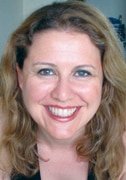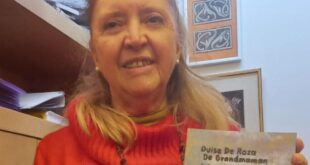
Susanna Zaraysky speaks eight languages, but Ladino isn’t one of them. That didn’t stop her from making a film about a Sarajevo Jew who does speak Judeo-Spanish and how it helped save his life during the Holocaust.
Her 53-minute documentary “Saved by Language” reveals how Moris Albahari, 84, used the “Yiddish of Sephardim” to survive. Albahari is one of only four people Zaraysky found in Sarajevo who speak Ladino, a 500-year-old language developed by Jews impacted by the Spanish Inquisition.
She will show clips from the film during presentations next week in San Francisco and Berkeley on the history of Ladino and its use today.
A language specialist and world traveler, Zaraysky became fascinated with Ladino — and Albahari’s story —while working on postwar economic development projects in Sarajevo in 2000.
“When I got to Bosnia, I was able to understand some of the languages, and this came as a surprise to me,” said Zaraysky, a Cupertino resident originally from Leningrad, Russia. A friend had suggested she visit the local synagogue, where Zaraysky said she was also surprised to see a Latin name on a Slavic country’s shul.
Inside, “I heard what I thought was Spanish in parts of the service,” Zaraysky said. “I asked about it afterwards and learned something about the history of Ladino.”
One day she was approached by Albahari, who told her the story of how his ability to speak Ladino likely saved his life during the Nazi/fascist occupation of his country.
At age 11, Albahari escaped from a train taking Yugoslavian Jews to concentration camps, and used Ladino to speak with a sympathetic Italian colonel who brought him to safety. Years later, Albahari again used Ladino to communicate with a Hispanic U.S. pilot, leading him to a secure partisan base.

“I kept that fascinating story in my head for years,” Zaraysky said. “Later, I was in Istanbul for a few days and hoped to meet some Ladino speakers, but it happened to be a Muslim holiday and everything — even the Jewish things — were closed.”
Upon her return to the U.S., Zaraysky wrote a blog about Albahari, which she translated into Spanish and forwarded to CNN Latino in Miami. She was invited to discuss his story on several programs, she said.
Zaraysky later met Bryan Kirschen, now a linguistics and Spanish professor at New York University, through ucLADINO, a group he founded at UCLA. He became interested in her project and co-produced the film.
“When Susanna presented the idea to me, it aligned perfectly with my research interests, but more importantly, allowed me the opportunity to learn about another Sephardic community with which I had not had much previous contact,” Kirschen said. “It was an incredible experience.”
The two 30-somethings began working on the project in July 2012. Zaraysky returned to Sarajevo three times for filming and editing before the film was completed in July 2014.
If there is an overarching message she’d like to impart to viewers, it’s that language is more than a tool to communicate: It’s an irreplaceable repository of culture that every effort should be made to preserve. This is true not only for Ladino, she said, but for the world’s 3,000 or so endangered languages.
“It is a difficult battle. Many have given up on the language. They lament the passing of the language, but are doing nothing to preserve it. It really takes people from the younger generation or outsiders to take an interest,” she said.
“We lose access to history, medicine, cuisine, when we lose a language. … Even if you think, ‘who needs this ancient language?’ Here, this one saved this man’s life.”
“Saved by Language” demonstrates the power of language, Kirschen said. “It is through our protagonist, Moris Albahari, that we see how language is able to both unite and aid people in time of need, while also being able to cause much destruction and war. We hope that our viewers recognize the importance of learning languages, and how language may serve as a window into another culture.”
Susanna Zaraysky will speak at 7 p.m. Tuesday, Oct. 20 at the Jewish Community Library, 1835 Ellis St., S.F. (http://www.jewishlearningworks.org) and 12 p.m. Wednesday, Oct. 21 at the Magnes, 2121 Allston Way, Berkeley. (http://www.magnes.org)
Free screenings of “Saved by Language” will take place at 6:30 p.m. Oct. 29 at the University of San Francisco, Fromm Hall 120, Xavier Auditorium, 2130 Fulton St., S.F. (http://tinyurl.com/qhr49j3) and 7 p.m. Nov. 3 at the Magnes.
by rachel raskin-zrihen , j. correspondent
Source JWeekly – Thursday, October 15, 2015
NdR: ** Article Corrections: Susanna Zaraysky can speak Ladino and Bryan Kirschen is a professor at the State University of New York at Binghamton and not at New York University.
 eSefarad Noticias del Mundo Sefaradi
eSefarad Noticias del Mundo Sefaradi

